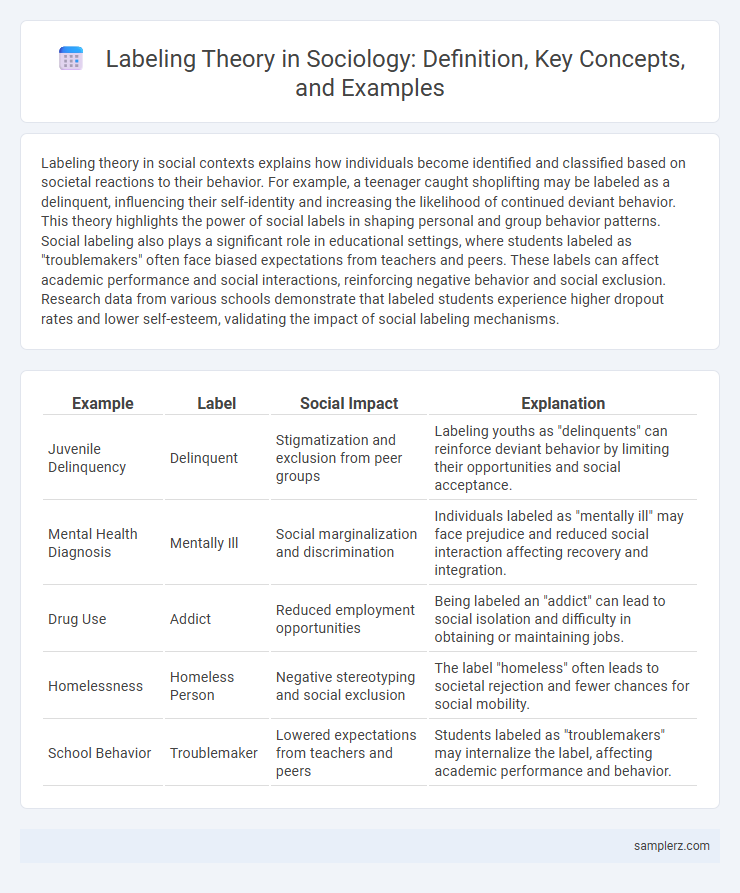Labeling theory in social contexts explains how individuals become identified and classified based on societal reactions to their behavior. For example, a teenager caught shoplifting may be labeled as a delinquent, influencing their self-identity and increasing the likelihood of continued deviant behavior. This theory highlights the power of social labels in shaping personal and group behavior patterns. Social labeling also plays a significant role in educational settings, where students labeled as "troublemakers" often face biased expectations from teachers and peers. These labels can affect academic performance and social interactions, reinforcing negative behavior and social exclusion. Research data from various schools demonstrate that labeled students experience higher dropout rates and lower self-esteem, validating the impact of social labeling mechanisms.
Table of Comparison
| Example | Label | Social Impact | Explanation |
|---|---|---|---|
| Juvenile Delinquency | Delinquent | Stigmatization and exclusion from peer groups | Labeling youths as "delinquents" can reinforce deviant behavior by limiting their opportunities and social acceptance. |
| Mental Health Diagnosis | Mentally Ill | Social marginalization and discrimination | Individuals labeled as "mentally ill" may face prejudice and reduced social interaction affecting recovery and integration. |
| Drug Use | Addict | Reduced employment opportunities | Being labeled an "addict" can lead to social isolation and difficulty in obtaining or maintaining jobs. |
| Homelessness | Homeless Person | Negative stereotyping and social exclusion | The label "homeless" often leads to societal rejection and fewer chances for social mobility. |
| School Behavior | Troublemaker | Lowered expectations from teachers and peers | Students labeled as "troublemakers" may internalize the label, affecting academic performance and behavior. |
Defining Labeling Theory in Social Contexts
Labeling theory in social contexts explains how individuals become socially defined by the labels assigned to them, often influencing their self-identity and behavior. A key example is the criminal justice system, where being labeled a "criminal" can lead to a self-fulfilling prophecy and increased likelihood of reoffending. This theory highlights the power of societal reaction and stigma in shaping personal trajectories and social deviance.
The Impact of Labels on Individual Identity
Labels significantly influence individual identity by shaping self-perception and social interactions. According to labeling theory, when society categorizes someone as deviant or criminal, that label can become a self-fulfilling prophecy, reinforcing negative behaviors and stigmatization. This impact is evident in cases like juvenile delinquency, where stigmatizing labels often hinder rehabilitation and promote persistent deviance.
Real-Life Case Studies of Labeling in Society
In social contexts, labeling theory is exemplified by real-life case studies such as the criminal justice system's impact on recidivism, where individuals labeled as "offenders" face social stigma that reinforces criminal identity. Another case involves mental health, where patients labeled as "mentally ill" often experience social exclusion and discrimination, affecting their integration into society. Educational settings also demonstrate labeling effects, with students branded as "troublemakers" frequently experiencing altered teacher expectations and peer relationships that hinder academic success.
Labeling and Social Deviance: Classic Examples
Labeling theory in social deviance illustrates how individuals become identified as deviant based on society's reaction rather than their actions, exemplified by cases like juvenile delinquency where youth labeled as "delinquents" often continue to engage in deviant behavior. The classic example of mental illness labeling demonstrates how persons diagnosed with psychiatric disorders may face social stigma that reinforces deviant identities and limits social opportunities. In criminal justice, the label of "criminal" frequently perpetuates a self-fulfilling prophecy, increasing recidivism and social exclusion.
Stigma and Social Exclusion Resulting from Labels
Labeling theory highlights how individuals branded with deviant labels often face stigma, which leads to social exclusion and marginalization within their communities. This process reinforces negative self-identity and limits opportunities for social integration, perpetuating cycles of deviance and discrimination. Studies in sociology emphasize that stigma from labels affects mental health, employment prospects, and access to social resources, deepening social inequalities.
The Role of Institutions in Social Labeling
Institutions such as schools, law enforcement agencies, and media outlets play a crucial role in social labeling by reinforcing norms and defining deviance. Educational institutions often label students through tracking systems or disciplinary actions, which can influence their self-identity and social trajectories. Law enforcement agencies disproportionately label minority groups, contributing to stigmatization and perpetuating cycles of marginalization within social structures.
Media Influence on Societal Labeling
Media influence significantly shapes societal labeling by framing individuals or groups in ways that reinforce stereotypes and social stigmas. News outlets and social media platforms often emphasize deviant behavior, amplifying negative labels such as "criminal" or "outsider," which can affect public perception and treatment. This phenomenon supports labeling theory by demonstrating how media narratives contribute to the social construction of identity and deviance.
Labeling in Schools: Effects on Students
Labeling in schools significantly impacts students' academic performance and self-esteem, as negative labels such as "troublemaker" or "slow learner" often result in a self-fulfilling prophecy. Research shows that students labeled as underachievers are more likely to disengage from classroom activities and exhibit behavioral issues. These stigmatizing labels reinforce social inequalities, influencing students' educational trajectories and future opportunities.
Criminal Justice System and Labeling Theory
Labeling theory in the criminal justice system explains how individuals labeled as "criminals" often face stigmatization that reinforces deviant behavior and social exclusion. Studies show that once labeled, offenders experience harsher sentencing and reduced opportunities for rehabilitation, perpetuating a cycle of recidivism. This theory highlights the significant impact of societal reactions and official sanctions on criminal identity formation within justice processes.
How Labeling Shapes Group Dynamics in Communities
Labeling theory reveals how assigning identities such as "deviant" or "outsider" to individuals influences group interactions and social cohesion within communities. When labels are internalized, they affect self-perception and behavior, often reinforcing exclusion or marginalization by the wider group. This dynamic alters community norms and power structures, shaping collective responses to conformity and deviance.

example of labeling theory in social Infographic
 samplerz.com
samplerz.com